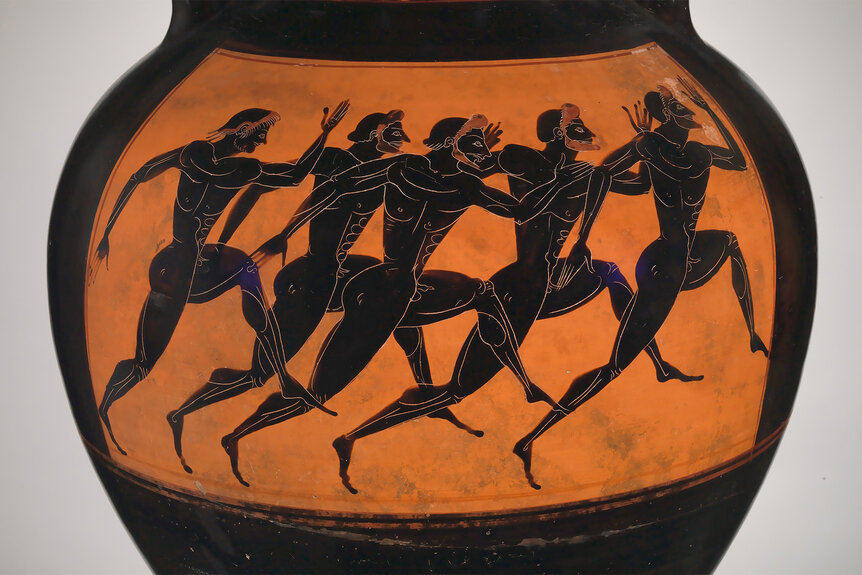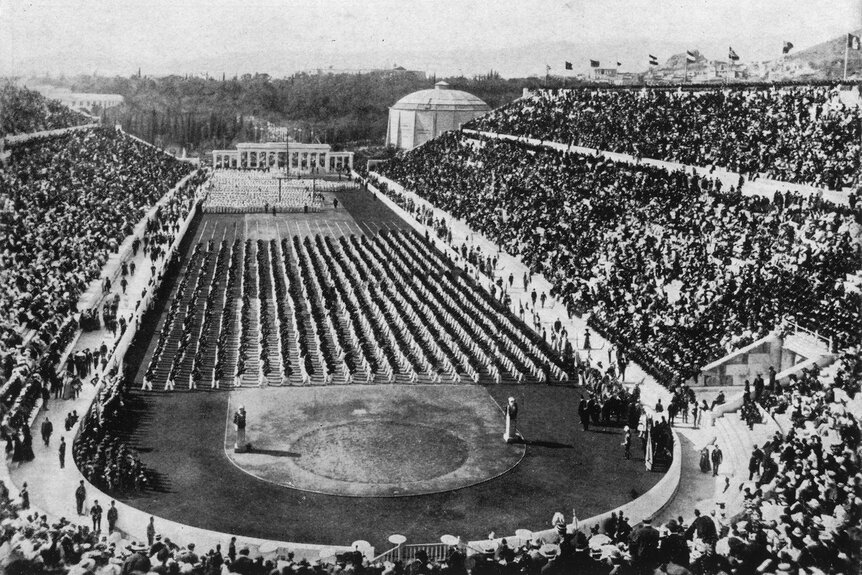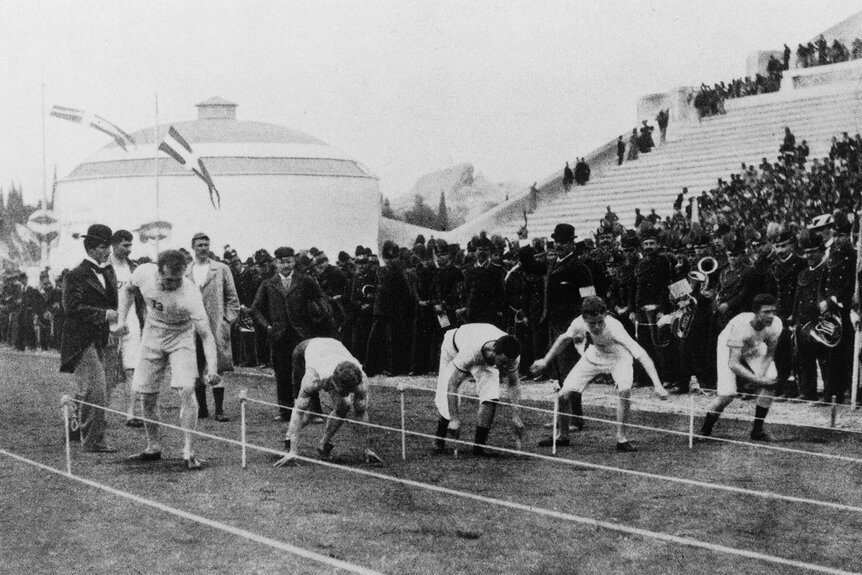Create a free profile to get unlimited access to exclusive show news, updates, and more!
The History of the Olympic Games, From Ancient Greece to the Modern Era
Take a trip back to 776 B.C.E. with this fun look back at the sporting event started by the ancient Greeks.
The Olympics are back for another summer of record-breaking, historic Games.
Come July 2024, millions will descend upon Paris, France to attend the Summer Games. Some attendees are hoping to see their favorite athletes take home the gold in their respective sports, while others are merely excited to see skateboarders like Nyjah Huston do an ollie at the Place de la Concorde. In short, there's something for everyone, an aspect of the Games that has made it an enduring institution in the modern era.
However, while the Games have changed pretty drastically in the centuries since the Greeks first established the event, many of its traditions date back to 776 B.C.E.
RELATED: Find Out Which New Sports Will Debut at the 2024 Paris Olympics
When were the first Olympics?
Though historians can't be totally sure, it's believed the first Ancient Olympic game was recorded in 776 B.C.E., according to Olympics.com. Games were subsequently held every four years from then until 393 C.E.
It wasn't simply an athletic competition when it began, but instead a "religious festival held in a religious sanctuary," Paul Christesen, professor of Ancient Greek History at Dartmouth College, told Olympics.com. Olympia, after all, was the mythical home of the ancient Greek gods such as Zeus, and the earliest Games were undertaken with religion front and center. For more than two centuries, races would conclude at the sacred olive tree of Zeus, and the victory wreaths awarded to the winners were cut from that same tree.
The Games were even given a divine origin in Greek mythology, which held the Gods competed in the first-ever Games. According to the legend, Herakles, also known as Hercules, created the Olympics and was one of its strongest competitors. Zeus is also said to have competed against his father, Kronos, for the throne, according to the Metropolitan Museum of Art.
Why were the Ancient Olympic Games created?
The Gods were the focal point of the Games, which provided an opportunity for the Greek to come together and celebrate their deities for five days straight. Amid the games, they sacrificed cows to honor Zeus in particular, an occasion that saw famed boxer Milon of Croton show off his brute strength in fabulous fashion. "As part of the big sacrifice (to Zeus held during each Games) he carried a cow into the sanctuary on his back, killed it and then ate the whole cow himself in a single day," Christesen told Olympics.com.
Ancient Olympic Sports and Rules
At the time, all Greek males were allowed to compete in the event and attend, regardless of rank and status. Women, on the other hand, were forbidden entirely from the Games.
Though this limited the amount of spectators in attendance, records show that the stadium in Olympia once fit 40,000 people, according to Olympics.com. Other Grecians and people from around the Mediterranean also gathered outside the stadium, which was eventually transformed from a wheat field into a massive stadium. There was food, music, and vendors selling souvenirs to the people who came from near and far.
As for the sporting events, there were foot races, jumping, discus throwing, javelin throwing, wrestling, the pentathlon, and a form of hand-to-hand combat known as pankration — a mix of boxing and wrestling. Later, chariot races and other events would be added to the program.
Much like today, athletes rigorously prepared for their respective sports, working with trainers for weeks before the Games began.
RELATED: What is the Route for the 2024 Paris Olympic and Paralympic Torch Relays?
When the day finally came for the competitors to take center stage, they had to strip down. That's right — in the Ancient Olympics, all athletes competed entirely naked, even for the hand-to-hand combat events, as music played in the background. To make it more competitive, the wrestlers and pankration athletes were also covered in oil, according to Olympics.com.
There were few rules governing the Games themselves, creating a violent spectacle for those in attendance. In pankration, the only restrictions were that athletes couldn't gouge each other in the eyes or bite, while boxers were merely advised to avoid hitting their opponent's genitals.
And since there were no time limits or points being taken, the matches could be long. One competitor, Sostratos, was nicknamed "Fingertips" because he'd start off the match by breaking his adversary's fingers, according to The Met. Then, there was Melankomas of Caria, who is reported to have won his matches without dealing a single blow. Per the Met, his tactic was to dodge hits and exhaust his competitor until they signaled defeat by raising their index fingers. Christesen told Olympics.com that some athletes would die if they didn't raise their index fingers and surrender in time.
Though medals did not yet exist, victors were awarded the aforementioned wreaths cut from the olive trees of Olympia in the early games. Other prizes largely depended on the location of the games. For example, in one of the ceremonies, winners were gifted a hydria, also known as a water jar. Some of these water jars had the names of the presiding official and the Greek God honored by the event, as seen in photos from The Met.
When did the Ancient Olympics end?
Most historians agree that the Ancient Olympics drew to a close in 393 C.E., when Roman emperor Theodosius I banned cities from hosting games because of its paganist roots. However, historian Tony Perrottet writes in The Naked Olympics that some cities in Greece continued to host the Games, as discovered in ancient inscriptions and writings.
When did the Modern Olympics start?
Centuries later, Baron Pierre de Coubertin — the designer of the now iconic Olympic rings — and others organized the Olympic Congress, held at the Grand Amphitheatre at the Sorbonne University in June 1894. The sporting events held that week would serve as a template for future iterations of the Games and allowed organizers to formalize decisions surrounding the first official Games, which would be held in Athens, Greece two years later. With a date set and venue chosen, the International Olympic Committee was established and work got underway.
To prepare for the Games' resurrection, the Panathenaic stadium in Athens, where the ancient games were believed to be held, had to be renovated to accommodate the crowds of tourists and athletes. Nearly 80,000 people are estimated to have attended, according to the National Endowment for the Humanities, while athletes from 13 nations competed in 43 different sporting events.
According to early reports from The Guardian, the June 1896 Opening Ceremony included a speech by the Greek Crown Prince Constantine. At the end of the Games, the Royal Family returned to the stadium to crown the victors, a majority of whom were Americans, and held a banquet in their honor.
"Let me express the pleasure that all feel in seeing you come here to take part in the Olympic games. Your reception shows how the Greek people rejoiced to receive you. I seize this occasion to extend my warmest congratulations to the victors… Keep us close in your remembrance and do not forget the enthusiastic welcome we have given you," King George I told the winners, the New York Tribune reported.
And since then, the Games have been held regularly, becoming both a sporting competition and cultural exchange for the world community.









